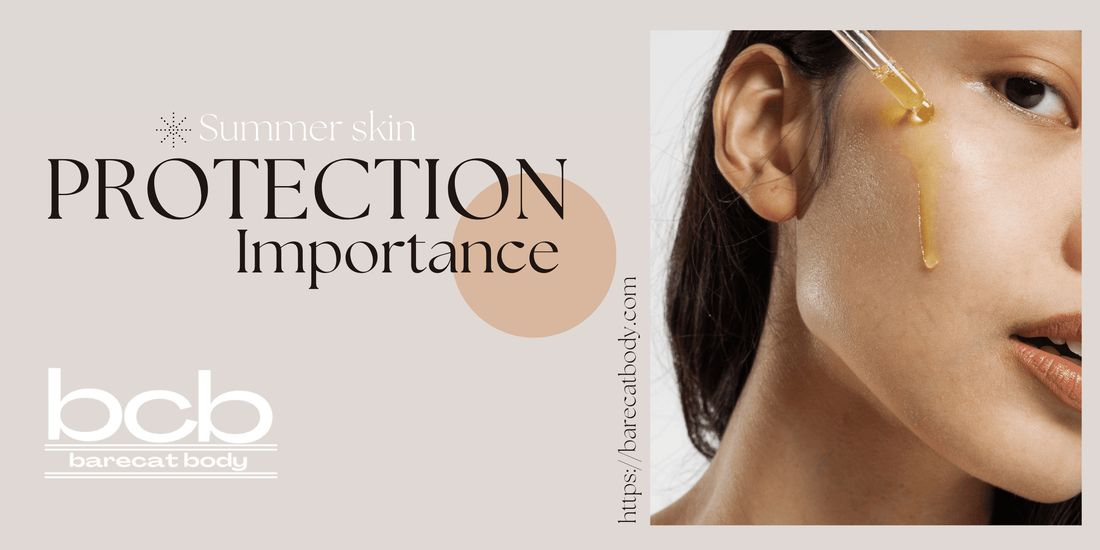
Summer Skin Protection for Melanated Skin: Top Ways to Prevent Sun Exposure Requiring Medical Attention
Share
Summer brings sunshine, warmth, and outdoor activities, but it also poses unique challenges for individuals with melanated skin. People with more melanin in their skin have a higher level of natural sun protection, but that does not mean they are immune to the harmful effects of UV rays. In fact, melanated skin can still suffer from sunburn, hyperpigmentation, and other sun-related skin issues. To ensure a safe and enjoyable summer, it is crucial for individuals with melanated skin to take proactive steps to protect themselves from excessive sun exposure. In this blog post, we will discuss the top ways to prevent sun exposure that may require medical attention.
- Apply Broad-Spectrum Sunscreen:
Regardless of skin color, applying sunscreen is essential for everyone. Look for a broad-spectrum sunscreen with an SPF of 30 or higher. This helps protect against both UVA and UVB rays. Be sure to apply sunscreen generously to all exposed areas of the body, including the face, neck, ears, arms, and legs. Don't forget often overlooked areas like the back of the hands, the back of the neck and the tops of the feet.
- Seek Shade During Peak Hours:
The sun's intensity is at its highest between 10 a.m. and 4 p.m. During these hours, it's advisable to seek shade whenever possible. Find refuge under trees, umbrellas, or canopies to minimize direct exposure to intense sunlight. By reducing the time spent under direct sunlight during peak hours, you can significantly decrease the risk of sunburn and other related skin issues.
- Wear Protective Clothing:
In addition to sunscreen, wearing protective clothing can provide an extra layer of defense against harmful UV rays. Opt for lightweight, loose-fitting clothing that covers the arms, legs, and torso. Dark-colored or tightly woven fabrics offer better protection. Don't forget to wear a wide-brimmed hat to shield your face, neck, and scalp, and choose UV-blocking sunglasses to protect your eyes and the delicate skin around them.
- Hydrate Your Skin:
Maintaining skin hydration is crucial during the summer months, especially for individuals with melanated skin. Hot weather and sun exposure can lead to dryness and irritation. Use a gentle moisturizer daily to lock in moisture and create a protective barrier. Look for moisturizers with hydrating ingredients like hyaluronic acid or glycerin. Apply the moisturizer immediately after bathing or showering to maximize absorption.
- Stay Hydrated Internally:
Don't forget to hydrate your body from the inside out by drinking an adequate amount of water. Water helps maintain overall skin health and elasticity, while also preventing dehydration and promoting optimal bodily functions. Aim for at least eight glasses of water per day, and increase your intake during hot and humid weather or when engaging in physical activities.
- Be Mindful of Exfoliation:
Exfoliation can be beneficial for removing dead skin cells and promoting a radiant complexion. However, it's important to approach exfoliation with caution, especially during summer. Excessive or harsh exfoliation can disrupt the skin's natural barrier and increase sensitivity to the sun. Opt for gentle exfoliation methods like chemical exfoliants (e.g., AHAs or BHAs) rather than physical scrubs. Limit exfoliation to once or twice a week, and always follow up with adequate sun protection.
- Address Hyperpigmentation Carefully:
Individuals with melanated skin are more prone to hyperpigmentation, a condition characterized by darkened patches on the skin. Sun exposure can worsen existing hyperpigmentation and lead to the formation of new spots. To address hyperpigmentation, consider incorporating gentle, skin-brightening ingredients into your skincare routine, such as vitamin C or niacinamide. Always wear sunscreen to prevent further darkening of existing areas of hyperpigmentation.
- Protect Your Lips:
The delicate skin of the lips is often overlooked but is just as susceptible to sun damage as the rest of the body. Use a lip balm with SPF protection to shield your lips from harmful UV rays. Reapply throughout the day, especially after eating, drinking, or wiping your mouth.
- Regularly Check for Changes:
Perform regular self-examinations of your skin to check for any changes in moles, freckles, or other skin lesions. Look for new or evolving spots, changes in size, shape, color, or texture, as these could be potential signs of skin cancer.
You are family, do this with and for one another, regularly to catch skin issues before they need medical intervention.
If you notice any concerning changes, consult a dermatologist promptly for a professional evaluation.
- Consult a Dermatologist:
Lastly, remember that regular visits to a dermatologist are essential for maintaining skin health. A dermatologist can provide personalized recommendations, perform skin cancer screenings, and address any specific concerns you may have about your skin. They can guide you on proper skincare routines, offer treatment options for sun-related skin issues, and help you navigate any unique challenges related to melanated skin.
By following these top ways to prevent sun exposure requiring medical attention, individuals with melanated skin can enjoy a safe and worry-free summer. Protecting your skin from the harmful effects of the sun is crucial for maintaining skin health, preventing sunburn, hyperpigmentation, and reducing the risk of skin cancer. Remember, even with the natural sun protection provided by melanin, proactive measures and sun-safe habits are vital for maintaining optimal skin health throughout the sunny season. Prioritize your skin's well-being, and enjoy the summer sun responsibly! Above all Nurture your body, Naturallly.
